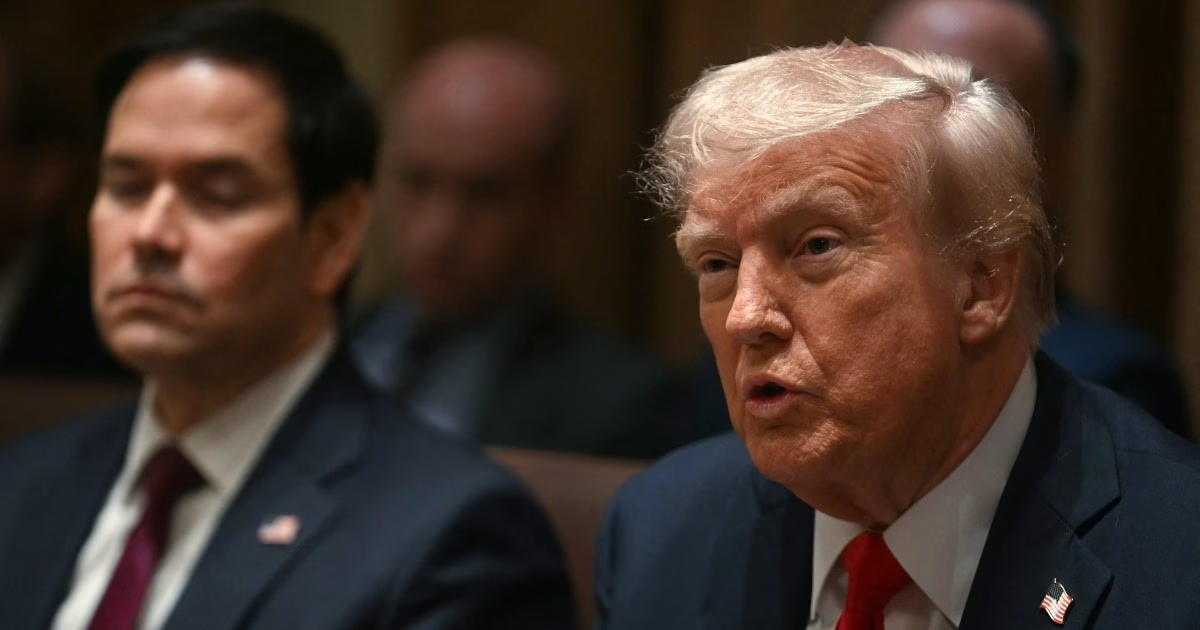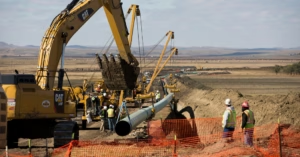European Commission will take strong and immediate action against unjustified trade restrictions.
President of the United States, Donald Trump, has announced a 25% tariff on imports from the European Union, alleging that the bloc was established to “damage” the United States.
During the first cabinet meeting on Wednesday, Trump mentioned that the decision on tariffs has been finalized and will be announced “very soon”.
“Generally speaking, it’ll be 25 percent,” Trump informed reporters, adding that this tariff will apply to vehicles and other products.
Trump repeated his usual claim that the US is treated unfairly in trade deals, asserting that the 27-nation bloc refuses US automobiles and agricultural products while the US accepts everything from Europe.
Currently, the EU imposes a 10% tariff on US vehicle imports, which is considerably higher than the 2.5% tariff applied by the US to European passenger car imports.
However, the US imposes a 25% tariff on imported pick-up trucks.
“To be honest, the European Union was formed to damage the United States,” Trump stated.
“That’s the reason for it, and they have done a good job of it.”
Trump’s comments quickly prompted a response from the European Commission, the bloc’s executive body, which stated that the largest single market in the world has been highly beneficial for the US.
“The EU will react firmly and immediately against unjustified barriers to free and fair trade, including when tariffs are used to challenge legal and non-discriminatory policies,” a spokesperson said.
“The EU will always protect European businesses, workers, and consumers from unjustified tariffs.”
Sweden’s former Prime Minister Carl Bildt stated on X that Trump has a “seriously distorted” view of history, pointing out that the EU was originally established to “prevent war on the European continent”.
Trump’s latest trade threat comes at a time of escalating tensions between Washington and Brussels over his administration’s “America First” approach to international affairs.
In addition to driving up trade tensions, Trump’s outreach to Russian President Vladimir Putin and verbal attacks on Ukrainian President Volodymyr Zelenskyy have raised concerns about his commitment to Europe’s security and the future of the North Atlantic Treaty Organization (NATO).
With Trump promising to quickly end the war in Ukraine, officials in Kyiv and Brussels fear that the US President may be leaning towards a peace agreement that heavily favors Russia, including allowing Moscow to retain Ukrainian territories it seized during the invasion.
On Monday, Friedrich Merz, Germany’s designated Chancellor, said his country must achieve “independence” from the US as “Americans, or at least this portion of the Americans… care very little about the fate of Europe”.
Merz, who is attempting to establish a coalition government after his Christian Democratic Union-Christian Social Union (CDU/CSU) won the most seats in parliamentary elections on Sunday, is uncertain if NATO will remain in its current form by mid-year or if there will be a need to quickly establish an independent European defense capability.
In an interview with Fox News on Wednesday, US Secretary of State Marco Rubio sought to calm concerns about NATOs future while urging European governments to invest more in their own defense.
“NATO is not at risk,” Rubio said in response to Merz’s comments. “The only thing that puts NATO at risk is that we have NATO allies who barely have militaries or whose militaries are not very capable due to a lack of investment over a long period.”
“These are wealthy countries, especially in Western Europe,” Rubio added. “They have plenty of money. They should be investing that in their national security, and they’re not.”
During the first cabinet meeting on Wednesday, Trump mentioned that the decision on tariffs has been finalized and will be announced “very soon”.
“Generally speaking, it’ll be 25 percent,” Trump informed reporters, adding that this tariff will apply to vehicles and other products.
Trump repeated his usual claim that the US is treated unfairly in trade deals, asserting that the 27-nation bloc refuses US automobiles and agricultural products while the US accepts everything from Europe.
Currently, the EU imposes a 10% tariff on US vehicle imports, which is considerably higher than the 2.5% tariff applied by the US to European passenger car imports.
However, the US imposes a 25% tariff on imported pick-up trucks.
“To be honest, the European Union was formed to damage the United States,” Trump stated.
“That’s the reason for it, and they have done a good job of it.”
Trump’s comments quickly prompted a response from the European Commission, the bloc’s executive body, which stated that the largest single market in the world has been highly beneficial for the US.
“The EU will react firmly and immediately against unjustified barriers to free and fair trade, including when tariffs are used to challenge legal and non-discriminatory policies,” a spokesperson said.
“The EU will always protect European businesses, workers, and consumers from unjustified tariffs.”
Sweden’s former Prime Minister Carl Bildt stated on X that Trump has a “seriously distorted” view of history, pointing out that the EU was originally established to “prevent war on the European continent”.
Trump’s latest trade threat comes at a time of escalating tensions between Washington and Brussels over his administration’s “America First” approach to international affairs.
In addition to driving up trade tensions, Trump’s outreach to Russian President Vladimir Putin and verbal attacks on Ukrainian President Volodymyr Zelenskyy have raised concerns about his commitment to Europe’s security and the future of the North Atlantic Treaty Organization (NATO).
With Trump promising to quickly end the war in Ukraine, officials in Kyiv and Brussels fear that the US President may be leaning towards a peace agreement that heavily favors Russia, including allowing Moscow to retain Ukrainian territories it seized during the invasion.
On Monday, Friedrich Merz, Germany’s designated Chancellor, said his country must achieve “independence” from the US as “Americans, or at least this portion of the Americans… care very little about the fate of Europe”.
Merz, who is attempting to establish a coalition government after his Christian Democratic Union-Christian Social Union (CDU/CSU) won the most seats in parliamentary elections on Sunday, is uncertain if NATO will remain in its current form by mid-year or if there will be a need to quickly establish an independent European defense capability.
In an interview with Fox News on Wednesday, US Secretary of State Marco Rubio sought to calm concerns about NATOs future while urging European governments to invest more in their own defense.
“NATO is not at risk,” Rubio said in response to Merz’s comments. “The only thing that puts NATO at risk is that we have NATO allies who barely have militaries or whose militaries are not very capable due to a lack of investment over a long period.”
“These are wealthy countries, especially in Western Europe,” Rubio added. “They have plenty of money. They should be investing that in their national security, and they’re not.”







